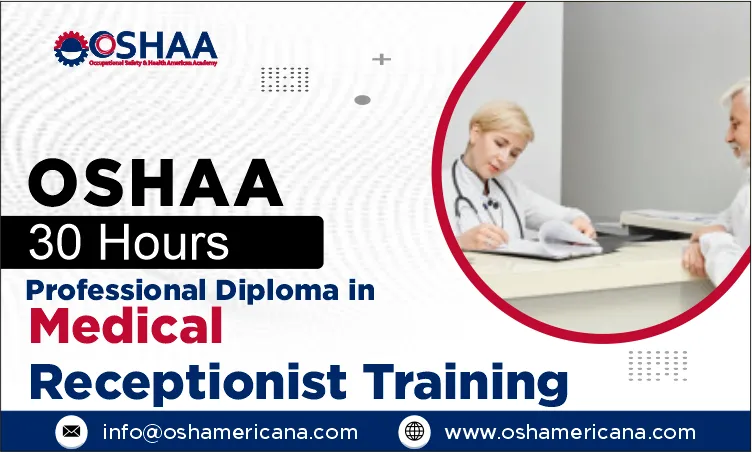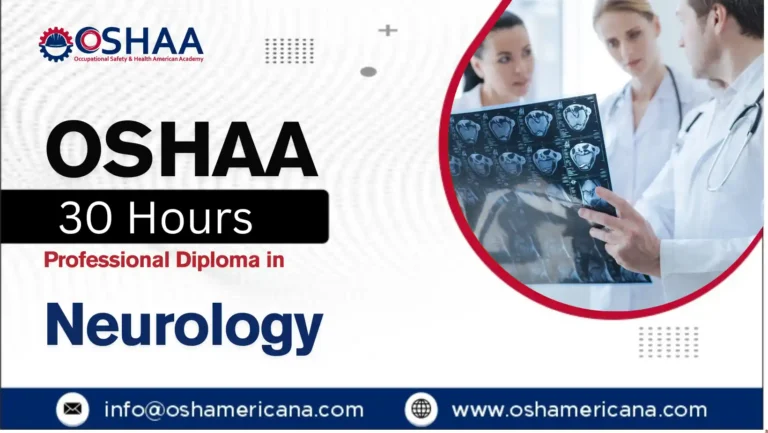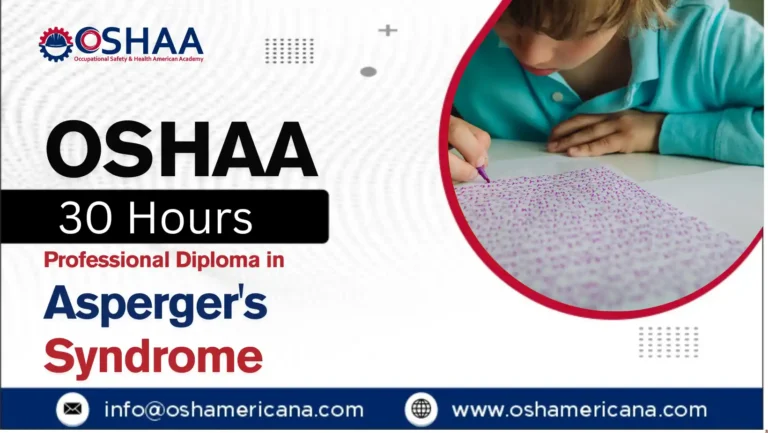Elevate caregiving expertise with the OSHAA 30-Hours Advance Medication for Caregivers course, mastering safe medication management, compliance, and patient-centered care.
The OSHAA 30-Hours Advance Medication for Caregivers course is a meticulously designed program that equips caregivers and healthcare professionals with advanced knowledge and practical skills essential for safe and effective medication management. In the modern caregiving landscape, the accurate administration of medications is a critical responsibility, particularly for elderly patients, individuals with chronic illnesses, or those with complex medical conditions. This comprehensive course ensures participants gain the expertise required to minimize risks, improve patient outcomes, and uphold the highest standards of care.
The curriculum of the OSHAA 30-Hours Advance Medication for Caregivers course covers an extensive range of topics, including understanding medication types, dosage calculations, recognition of potential side effects, and implementation of best practices in medication administration. The program integrates theoretical understanding with practical application, enabling caregivers to deliver care that adheres to global health and safety regulations while maintaining full compliance with relevant legal and ethical standards. By emphasizing patient-centered care, this course prepares participants to manage medications effectively across diverse healthcare and support environments.
Participation in the OSHAA 30-Hours Advance Medication for Caregivers course enhances professional competencies and supports career development for healthcare providers and caregivers. Learners acquire the ability to accurately administer medications, identify and manage potential complications, and develop effective medication management strategies. This not only strengthens practical caregiving abilities but also elevates professional qualifications, paving the way for career advancement within healthcare and social care sectors.
The course places a strong emphasis on safety, regulatory compliance, and operational efficiency. Through the OSHAA 30-Hours Advance Medication for Caregivers training, participants learn to reduce medication errors, safeguard patient well-being, and uphold ethical care standards. By integrating legal frameworks, industry best practices, and hands-on techniques, the program ensures that caregivers are fully prepared to meet the evolving demands of modern healthcare. Completing the OSHAA 30-Hours Advance Medication for Caregivers course empowers professionals to deliver high-quality, compliant, and patient-focused care, making it an indispensable qualification for anyone committed to excellence in caregiving and medication management.
This version naturally integrates the full course name multiple times, emphasizes compliance, safety, and professional development, and maintains a professional, engaging flow suitable for course webpages and SEO optimization.
OSHAA 30-Hours Advance Medication for Caregivers
To enroll in the OSHAA 30-Hours Advance Medication for Caregivers, learners are expected to meet the following criteria:
Age Requirement
- Participants must be at least 18 years of age to enroll in the OSHAA 30-Hours Advance Medication for Caregivers course.
- This age requirement ensures that learners possess the maturity and responsibility needed to manage medications safely and effectively.
- Meeting the minimum age allows participants to fully engage in both theoretical and practical components of the OSHAA 30-Hours Advance Medication for Caregivers program.
Educational Background
- Learners should have completed secondary education or its equivalent to participate in the OSHAA 30-Hours Advance Medication for Caregivers course.
- Higher education in healthcare, social care, or related fields is advantageous and can enhance comprehension of advanced medication management principles.
- A foundational educational background ensures that participants can understand the complex topics covered in the OSHAA 30-Hours Advance Medication for Caregivers curriculum.
Work Experience
- Prior experience in caregiving, healthcare, or support services is recommended but not mandatory for enrollment in the OSHAA 30-Hours Advance Medication for Caregivers course.
- Relevant work experience allows learners to relate practical knowledge to the advanced medication management techniques taught in the program.
- Even learners new to caregiving can successfully complete the OSHAA 30-Hours Advance Medication for Caregivers course with dedication and engagement in the structured training modules.
English Proficiency
- Learners must be able to read, write, and communicate effectively in English to fully comprehend the materials and regulatory guidelines presented in the OSHAA 30-Hours Advance Medication for Caregivers course.
- Proficiency in English ensures accurate understanding of medication protocols, safety procedures, and patient care standards emphasized throughout the OSHAA 30-Hours Advance Medication for Caregivers program.
- Effective English communication supports both learning outcomes and compliance with healthcare regulations, which are integral to the OSHAA 30-Hours Advance Medication for Caregivers curriculum.
This eligibility framework ensures that all participants enrolling in the OSHAA 30-Hours Advance Medication for Caregivers course are adequately prepared to gain maximum benefit from the program while maintaining the highest standards of safety, compliance, and professional development.
Study Units
Learning Outcomes
Introduction to Medication Management (4 Hours)
- Understand the key role of caregivers in the safe management of medications.
- Gain knowledge of different medication types and their uses in care settings.
- Learn the importance of accurate medication documentation and record-keeping.
- Understand the steps involved in the medication administration process.
Pharmacology and Drug Classifications (5 Hours)
- Understand the principles of pharmacology and how medications affect the body.
- Learn about various drug classifications and their therapeutic purposes.
- Understand how different medications work to treat specific conditions.
- Recognise the importance of correct drug selection for patients based on their medical needs.
Medication Administration Techniques (5 Hours)
- Master safe techniques for administering medications through various routes.
- Learn the correct procedures for administering oral, injectable, and topical medications.
- Understand the importance of accurate dosage and timing for medication administration.
- Develop the skills to handle and administer medications safely in different care settings.
Drug Interactions and Side Effects (5 Hours)
- Recognise common drug interactions and understand their potential impact on patient health.
- Learn how to identify and manage side effects associated with medications.
- Understand how to prevent, monitor, and address adverse reactions to medications.
- Develop the skills to report and respond appropriately to medication-related issues.
Patient Rights and Legal Considerations (4 Hours)
- Understand patient rights in the context of medication administration and informed consent.
- Learn about the legal and ethical responsibilities of caregivers when administering medication.
- Gain knowledge of UK laws and regulations surrounding medication management.
- Recognise the importance of patient confidentiality and privacy in medication handling.
Medication Storage and Safety (4 Hours)
- Learn the best practices for proper storage of medications to prevent contamination and errors.
- Understand the different storage requirements for various medications (e.g., temperature, light, moisture).
- Develop an understanding of how to manage expired or unused medications.
- Recognise the importance of maintaining safety and security when handling medications in care settings.
Monitoring and Reporting Medication Effects (3 Hours)
- Learn how to monitor patients for the effects of their prescribed medications.
- Understand the signs of medication-related complications and adverse reactions.
- Develop skills to document and report any issues related to medication administration.
- Recognise the importance of ongoing observation to ensure patient safety and wellbeing.
The OSHAA 30-Hours Advance Medication for Caregivers course offers comprehensive benefits for caregivers, healthcare professionals, and organizations committed to high-quality patient care. This advanced training program is designed to enhance knowledge, strengthen practical skills, and ensure regulatory compliance while supporting professional development. By enrolling in the OSHAA 30-Hours Advance Medication for Caregivers course, participants gain essential competencies that contribute to safer medication management, improved patient outcomes, and operational excellence across healthcare and caregiving environments.
1. Enhanced Medication Knowledge
- Participants develop a deep understanding of various medication types, their indications, and safe administration techniques.
- The OSHAA 30-Hours Advance Medication for Caregivers program ensures caregivers are confident in handling medications, reducing the risk of errors and promoting optimal patient care.
2. Improved Safety and Compliance
- The course emphasizes adherence to healthcare regulations, legal frameworks, and ethical standards.
- Completing the OSHAA 30-Hours Advance Medication for Caregivers course helps caregivers maintain compliance with local and international healthcare guidelines, protecting both patients and organizations.
3. Risk Reduction in Patient Care
- Caregivers learn to identify potential medication errors, side effects, and contraindications.
- Through the OSHAA 30-Hours Advance Medication for Caregivers training, participants enhance safety measures, minimizing risks in patient care environments.
4. Professional Skill Development
- Participants acquire advanced practical skills in dosage calculation, medication administration, and monitoring patient responses.
- The OSHAA 30-Hours Advance Medication for Caregivers course equips professionals with competencies essential for career progression in healthcare and caregiving sectors.
5. Operational Efficiency and Cost Savings
- Improved medication management reduces wastage, errors, and associated costs.
- Organizations benefit from trained staff completing the OSHAA 30-Hours Advance Medication for Caregivers program, leading to streamlined operations and better resource utilization.
6. Leadership and Communication Skills
- The course strengthens caregivers’ ability to communicate effectively with healthcare teams and patients.
- Completing the OSHAA 30-Hours Advance Medication for Caregivers course enhances leadership capabilities, enabling participants to guide colleagues and implement best practices.
7. Enhanced Patient Well-being and Satisfaction
- Caregivers learn strategies for patient-centered care and individualized medication management.
- The OSHAA 30-Hours Advance Medication for Caregivers program directly improves patient outcomes and satisfaction by ensuring safe and responsive care.
8. Emergency Preparedness and Risk Management
- Participants are trained to respond to medication-related emergencies and adverse reactions.
- The OSHAA 30-Hours Advance Medication for Caregivers course ensures caregivers are prepared for critical situations, promoting safety and confidence in healthcare settings.
9. Continuous Professional Improvement
- The curriculum encourages reflective practice and ongoing learning in medication management.
- Completing the OSHAA 30-Hours Advance Medication for Caregivers course fosters a culture of continuous improvement, ensuring caregivers remain up-to-date with evolving healthcare standards.
10. Career Advancement Opportunities
- Graduates gain a recognized qualification that enhances employability and professional credibility.
- The OSHAA 30-Hours Advance Medication for Caregivers course supports career growth in healthcare, social care, and related professional sectors.
11. Multidisciplinary Collaboration
- Caregivers develop the ability to work effectively with interdisciplinary healthcare teams.
- The OSHAA 30-Hours Advance Medication for Caregivers program strengthens collaboration, improving overall patient care coordination.
12. Ethical and Legal Competence
- Participants understand the ethical responsibilities associated with medication management.
- The OSHAA 30-Hours Advance Medication for Caregivers course ensures that caregivers operate within legal and ethical frameworks, safeguarding both themselves and their patients.
13. Enhanced Confidence and Professional Assurance
- By mastering advanced medication skills, caregivers gain confidence in their daily responsibilities.
- The OSHAA 30-Hours Advance Medication for Caregivers program empowers participants to deliver care with assurance, reducing stress and improving workplace performance.
14. Quality Improvement in Care Settings
- The course supports the implementation of best practices for medication administration.
- Graduates of the OSHAA 30-Hours Advance Medication for Caregivers course contribute to higher standards of care and continuous quality improvement in healthcare facilities.
15. Global Best Practices and Standardization
- Participants are introduced to international standards in medication management and caregiving practices.
- The OSHAA 30-Hours Advance Medication for Caregivers course ensures that caregivers are aligned with globally recognized protocols, promoting safety and excellence in healthcare delivery.
The OSHAA 30-Hours Advance Medication for Caregivers course is a vital investment for healthcare professionals and organizations committed to patient safety, regulatory compliance, and professional development. By completing this program, caregivers acquire the knowledge, skills, and confidence required to manage medications effectively, enhance operational efficiency, and provide high-quality care in diverse healthcare and support settings.
The OSHAA 30-Hours Advance Medication for Caregivers course is meticulously designed for healthcare and caregiving professionals aiming to enhance their expertise in safe medication administration, patient monitoring, and comprehensive care delivery. This course is highly relevant for individuals, organizations, and stakeholders involved in health, social care, and support services. It emphasizes regulatory compliance, patient safety, ethical practices, and professional development. With increasing global standards for healthcare, the OSHAA 30-Hours Advance Medication for Caregivers course ensures participants are fully prepared to manage medications responsibly, minimize risks, and uphold high-quality care in any professional setting. The program equips learners with advanced knowledge, practical skills, and strategic understanding to meet both organizational and OSHA compliance requirements while improving patient outcomes.
1. Registered Nurses
- Play a critical role in administering medications and monitoring patient responses in hospitals and clinical settings.
- Gain advanced knowledge of medication pharmacology, dosage calculations, side-effect management, and safe administration practices through the OSHAA 30-Hours Advance Medication for Caregivers course.
- Enhance clinical decision-making and patient safety, reducing medication errors and improving care quality.
- Strengthen adherence to OSHA standards, workplace safety protocols, and ethical healthcare practices.
2. Caregivers and Support Workers
- Provide direct care for elderly, disabled, and chronically ill individuals, including administering medications.
- The OSHAA 30-Hours Advance Medication for Caregivers course equips them with practical skills to identify, administer, and monitor medications accurately and safely.
- Build confidence in handling complex medication schedules, including PRN (as needed) medications and multi-drug regimens.
- Promote compliance with regulatory requirements, ensuring the protection and wellbeing of vulnerable patients.
3. Healthcare Assistants
- Deliver hands-on care and assist in medication administration under supervision.
- Develop competence in understanding medication types, storage, potential adverse reactions, and administration protocols through the OSHAA 30-Hours Advance Medication for Caregivers course.
- Improve efficiency in patient care routines and contribute to a safer healthcare environment.
- Enhance operational standards in line with OSHA compliance and global best practices.
4. Social Care Managers
- Supervise staff, monitor service quality, and implement care policies within organizations.
- Gain insights from the OSHAA 30-Hours Advance Medication for Caregivers course to ensure effective medication management systems and staff adherence to safety protocols.
- Develop leadership skills to manage multidisciplinary teams and maintain accountability for patient care outcomes.
- Support legal compliance, risk mitigation, and workplace safety improvements.
5. Home Care Providers
- Deliver medication administration and care services in home environments.
- Learn strategies from the OSHAA 30-Hours Advance Medication for Caregivers course to manage medications accurately, monitor patient responses, and maintain high standards of home care.
- Implement patient-centered care plans that ensure safety, independence, and comfort.
- Uphold compliance with health regulations and minimize risks associated with unsupervised medication administration.
6. Allied Health Professionals
- Collaborate with care teams to deliver multidisciplinary support, including medication monitoring.
- The OSHAA 30-Hours Advance Medication for Caregivers course provides specialized knowledge to optimize medication administration, record-keeping, and patient education.
- Enhance communication and teamwork skills essential for integrated healthcare delivery.
- Contribute to overall organizational compliance, efficiency, and patient safety.
7. Clinical Supervisors
- Oversee staff performance and ensure proper medication administration across care units.
- Utilize knowledge from the OSHAA 30-Hours Advance Medication for Caregivers course to mentor and assess staff competencies.
- Implement risk reduction strategies and maintain high standards of clinical safety.
- Promote OSHA-compliant practices and ethical healthcare delivery.
8. Occupational Health Professionals
- Ensure safe work environments and medication practices across healthcare and care organizations.
- Apply insights from the OSHAA 30-Hours Advance Medication for Caregivers course to develop policies, training programs, and emergency procedures related to medication management.
- Strengthen organizational safety culture, reduce workplace incidents, and improve staff wellbeing.
- Support regulatory compliance and mitigate risks associated with medication errors.
9. Training and Development Coordinators
- Responsible for staff learning, upskilling, and competency development.
- Leverage the OSHAA 30-Hours Advance Medication for Caregivers course to design structured training programs that ensure all caregivers meet professional standards.
- Promote knowledge retention, adherence to care protocols, and operational consistency.
- Facilitate compliance with OSHA regulations and international health and safety standards.
10. Healthcare Organization Stakeholders
- Include directors, quality assurance managers, compliance officers, and policymakers.
- Gain strategic understanding from the OSHAA 30-Hours Advance Medication for Caregivers course to enhance organizational procedures for medication safety, patient care quality, and staff accountability.
- Ensure adherence to legal, ethical, and regulatory frameworks while improving patient outcomes.
- Promote a culture of continuous improvement, professional excellence, and operational efficiency.
The OSHAA 30-Hours Advance Medication for Caregivers course comprehensively equips healthcare and caregiving professionals across all roles with advanced knowledge, practical skills, and recognized certification. By completing this program, participants enhance their capacity to administer medications safely, respond to patient needs effectively, maintain regulatory compliance, and foster a culture of excellence in caregiving and healthcare environments. This course ensures that learners are fully prepared to meet the evolving challenges of modern healthcare, improve operational efficiency, and deliver safe, high-quality patient care.







